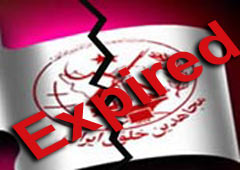A senior Turkish foreign ministry official underlined his country’s resolve to fight terrorism, and strongly condemned the crimes committed by the anti-Iran terrorist group, the Mojahedin-e Khalq Organization (MKO), against humanity. 
"Turkey has seriously confronted the MKO terrorists during the last few years and does not allow them to make any move, and it also condemns their crimes which should be viewed as crimes against humanity," Turkish Deputy Foreign Minster Hakki Akil said in a meeting with the members of the Iranian Edalat (Justice) Society (families of the victims of terrorism).
Akil also called for the establishment of direct ties and joint exhibitions as well as cooperation between the two countries’ NGOs as part of a joint campaign against terrorism and terrorist groups.
He highlighted Ankara’s sensitivity to the issue of terrorism, and added, "The Turkish nation and government believe that no rationale can justify terrorism, and terrorism in any place of the world and by any group is condemned (by Turkey)."
The official further underscored that his country would spare no effort to fight terrorism and terrorist groups.
The MKO targeted Iranian government officials and civilians in Iran and abroad in the early 1980s. The group also attempted an unsuccessful invasion of Iran in the last days of the Iraq-Iran war in 1988.
The MKO is behind a slew of assassinations and bombings inside Iran, a number of EU parliamentarians said in a letter in which they slammed a British court decision to remove the MKO from the British terror list. The EU officials also added that the group has no public support within Iran because of their role in helping Saddam Hussein in the Iraqi imposed war on Iran (1980-1988).
Many of the MKO members abandoned the terrorist organization while most of those still remaining in the camp are said to be willing to quit but are under pressure and torture not to do so.
A May 2005 Human Rights Watch report accused the MKO of running prison camps in Iraq and committing human rights violations.
According to the Human Rights Watch report, the outlawed group puts defectors under torture and jail terms.
The group started assassination of the citizens and officials after the Islamic Revolution in Iran in a bid to take control of the newly established Islamic Republic. It killed several of Iran’s new leaders in the early years after the Revolution, including the then President Mohammad Ali Rajayee, Prime Minister Mohammad Javad Bahonar and Judiciary Chief Mohammad Hossein Beheshti who were killed in bomb attacks by MKO members in 1981.
The group fled to Iraq in 1986, where it was protected by Saddam Hussein and where it helped the Iraqi dictator suppress Shiite and Kurd uprisings in the country.
The terrorist group joined Saddam’s army during the Iraqi imposed war on Iran (1980-1988) and helped Saddam and killed thousands of Iranian civilians and soldiers during the US-backed Iraqi imposed war on Iran.
The MKO was put on the US terror list in 1997 by the then President, Bill Clinton, but since the 2003 US invasion of Iraq, the group has been strongly backed by the Washington Neocons, who also argue for the MKO to be taken off the US terror list.



